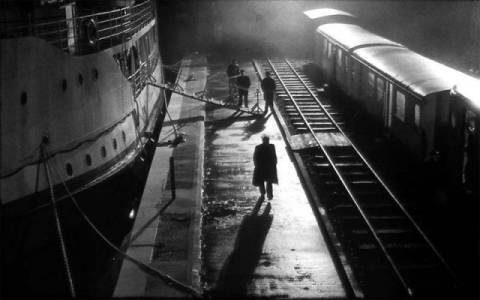 Image over matter
Image over matterThis selection of the New York Film Festival 2007 may be a fair introduction to the style of the critically celebrated Hungarian auteur, but its handling of an obscure Georges Simonon crime novel is a disappointment. Details that would make the story compelling in genre terms are dropped without the gain of existential dread the filmmaker seems to have had in mind. The richly textured black and white visuals are a pleasure, but the super-measured pace seems out of synch with a narrative of crime, furtive involvement, and investigation. Experts on the director say this isn’t his best and that’s a relief to know. Testimonials from Gus Van Sant, Jim Jarmusch, and the late Susan Sontag would lead one to expect much more. Despite beautiful imagery, this provides longeurs, not transcendence.
A man works nights at the switch station of a dock-to-tracks port outlet. It’s somewhere in France. Since everybody speaks Hungarian, two of the main actors are Czech and Scottish, and a couple of the main characters have English names, you might not pick up on that till later. Nearly all of the shots of this location are from the stationmaster’s elevated observation point, thus providing misty panoramas reminiscent of early modernist photography (Moholy Nagy’s for example), and they are the most beautiful images in the film. DP Fred Kelemen does not disappoint. Mihaly Vig's mournful score accompanies an excruciatingly slow series of opening up and down pans. Those who’ve heard Tarr is a terrible bore don’t have to wait long to have their point proven for them—but the aesthetics keep you watching.
Despite its maddening abstractness, in a way this is the most memorable part of the film. It also sets up the main event—which is that on this night when the ship lets off its passengers to mount a train, the signal man sees an attaché case thrown off the boat to a man waiting across the way on a cement platform. When he has the case in hand, another man comes by and tries to get it from him. In the intense struggle that ensues—all seen still only from a distance—the receiver of the case is knocked in the water with the case, and apparently drowns; the other man disappears. After boat and train have departed, Maloin (Miroslav Krobot, a Czech actor)—we learn later that’s the signalman’s name—retrieves the case from the water and finds it full of English pound notes, which he dries off little by little on his stove up above.
Maloin, whose viewpoint the film adheres to faithfully much of the time, to the extent of the camera’s being right over his shoulder more than once, is that regular in Simenon stories, a dreary Everyman who thinks a stroke of luck will alter his life but gradually learns otherwise. The same basic premise of an innocent falling upon a criminal’s treasure trove of cash inheriting nothing but trouble—will soon be seen at the festival, and before long by everyone else, in the Coen brothers’
No Country for Old Men. In Cormac McCarthy’s story, which is full of flash and suspense, dangerous men soon come after the finder. Maloin’s fate is much less dramatic. He takes his daughter Henriette (Erika Bok) out of her crummy job at an epicerie-butcher shop and buys her a nice fur neckpiece. She’s not a good looker, and she closely resembles her mom, a voice-dubbed Tilda Swinton, who’s crabby and disapproving. Obviously he can’t tell them anything. For a while nothing happens. Then a police Inspector Morrison (Istvan Lenart) arrives from London, because the money was stolen: £60,000 was seized by a certain Brown (Janos Derzi), and the drowned man was his accomplice, Teddy. Morrison explains everything and thus fills in the details of the original plot. The actual outcome, even after Maloin has committed a crime, turns out to be surprisingly mild.
The director has written as follows about the plot: "when Maloin witnesses a murder, his life changes. He has to confront the moral questions of what constitutes crime and punishment, where to draw the line between innocence and complicity in crime[;] skepticism leads him to questioning the very meaning and worth of existence…" All this doubtless ought to happen, but unfortunately in the movie Tarr made it doesn't. There are some mournfully droll scenes in the hotel bar where everybody meets. We follow Maloin plodding around the port and confronting his family. But these great
moral confrontations do not take place for us, or, on the evidence, for the protagonist.
Certainly there’s a very distinctive style here. But perhaps due to production problems causing the film to take four years to complete—the most notable interruption was the suicide of the famous indie producer Humbert Balsam in 2005—the flow is rather halting, and I don’t just mean slow (the running time is 135 minutes).
The Georges Simenon novel was previously made into a movie by the French director Henri Decoin in 1943.
An official selection of the New York Film Festival at Lincoln Center, 2007.





